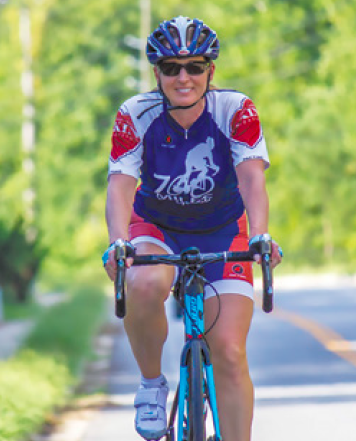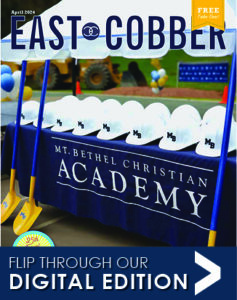Cara Seckman, a senior cheerleader at Walton High School, was diagnosed with Hemophagocytic lymphohistiocytosis, (HLH) last year. Despite an aggressive chemotherapy treatment, Cara died just three weeks after she was diagnosed. One of Carolyn Peacock’s daughters was best friends with Seckman, and the entire family was involved in the emotional turmoil caused by her death. Struggling to figure out a way to help the mourning family, Peacock learned about “700 Miles to Hope.” Between September 24-30, 20 bike riders will pedal 700 miles from Jackson, Mississippi, to the Cincinnati Children’s Hospital’s HLH Center of Excellence. Some of the riders involved are doctors at Cincinnati Children’s while others are HLH survivors, friends or family of HLH survivors and victims.
For the last five months, East Cobb resident Carolyn Peacock has been pushing her body and her bicycle to their limits so she can be one of the 18 riders participating in the 700-mile ride. During the week, Peacock does four days of speed training and tops it off with endurance riding on the weekends. Although her workouts are grueling, she readily admits that the pain she endures is nothing compared to the people with HLH. The Seckman family will be in Cincinnati to greet Mrs. Peacock and the other riders as they complete their journey, and will be able to meet with doctors and others affected by the disease.
All the money raised during the ride goes directly to Cincinnati Children’s Hospital’s HLH Center of Excellence. The center is home to the most experienced care team in North America treating HLH. The center provides a single resource for complete, family-centered care, from diagnosis to bone marrow transplant and long-term follow-up support. Emphasis is placed on educating families on the complexities of HLH, including diagnosis and treatment. Hemophagocytic lymphohistiocytosis, or HLH, is a rare autoimmune disorder that causes some white blood cells to attack their fellow blood cells instead of invading bacteria or viruses. These defective cells build up in the spleen and liver, causing both organs to swell. The disease can either be triggered by an infection or inherited through the family. Treatments range anywhere from simple courses of antibiotics to bone marrow transplants. The hospital uses the money to bolster diagnosis and clinical care, research, education and awareness, and family support.
Peacock and the Seckman family are discussing ways that the family can remain permanently involved in the ride, whether through sponsoring new riders for each successive event or by having Peacock return for 2017 and future rides.
So far, Peacock has raised just over $3,000 towards her $5,000 goal. If you would like to help the fight against HLH by supporting Peacock, please visit classy.org and search for Carolyn Peacock. Every single penny that is given to Carolyn’s campaign will go directly to the to Cincinnati Children’s Hospital’s HLH Center of Excellence.
This article originally appeared in the EAST COBBER September 2016 Issue.







